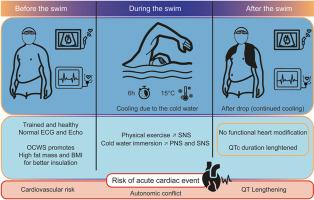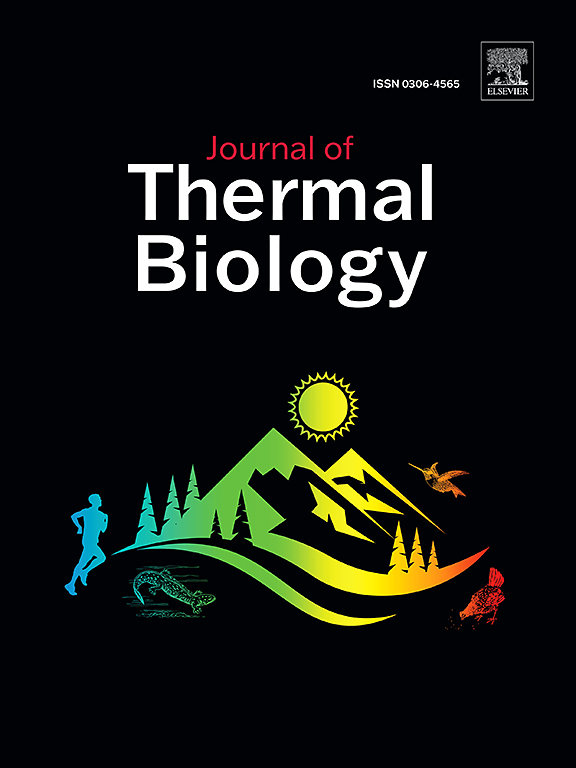户外冷水游泳后的心电和功能活动。
IF 2.9
2区 生物学
Q2 BIOLOGY
引用次数: 0
摘要
目的:参加室外冷水游泳(OCWS)活动将耐力锻炼和寒冷暴露结合在一起。人们开始担心在室外冷水游泳过程中,尤其是在耐力项目中发生急性不良心脏事件的潜在风险。我们分析了长时间 OCWS 对训练有素的运动员心脏功能的影响:游泳比赛包括在 15 °C的水中在 1000 米的赛道上游泳 6 小时。20名参赛者(11名男性,47.3±8.6岁)参加了比赛。在游泳过程中和游泳后 1 小时内,使用可摄入温度传感器监测核心温度(Tcore)。在比赛前一天和游泳结束后一小时内,对身体成分、血压、心电图和经胸超声心动图进行了评估:平均体重指数为 27.1 ± 5.1 kg/m2,脂肪含量为 25.2 ± 9.1%。平均游泳时间为 214 ± 115 分钟。最低温度为 35.6 ± 1.3 °C。运动后观察到心率校正后的 QT 间期(QTc)明显延长(437.7 ± 27.7 vs. 457.2 ± 35.9 ms,p = 0.012),其中 5 名参与者运动后 QTc >500ms。OCWS 没有改变双心室收缩功能和左心室舒张功能。ΔQTc与ΔTcore之间没有相关性:结论:在健康的训练人群中,OCWS 似乎能急性延迟运动后心脏复极化,但不会改变心脏功能。有必要进行更多研究,以探讨 QT 延长的临床意义及其与 OCWS 期间自律神经系统调节的关系。本文章由计算机程序翻译,如有差异,请以英文原文为准。

Cardiac electrical and functional activity following an outdoor cold-water swimming event
Aims
Participation in outdoor cold-water swimming (OCWS) events combines endurance exercise and cold exposure. Concerns have emerged about the potential risk of acute adverse cardiac events during OCWS, particularly during endurance events. We analysed the effect of prolonged OCWS on cardiac function in trained athletes.
Methods
The swimming event consisted of laps over a 1000-m course, for up to 6 h, in water at 15 °C. Twenty participants (11 males, 47.3 ± 8.6 years old) were included. Core temperature (Tcore) was monitored using an ingestible temperature sensor during and up to 1 h after the swim. Body composition, blood pressure, electrocardiogram (ECG), and transthoracic echocardiography were assessed 1 day before the event and within the first hour upon completion of the swim.
Results
Mean body mass index was 27.1 ± 5.1 kg/m2 and fat mass was 25.2 ± 9.1 %. Mean duration of swimming was 214 ± 115 min. Minimum Tcore was 35.6 ± 1.3 °C. A significant lengthening of the QT interval corrected (QTc) for heart rate was observed post-exercise (437.7 ± 27.7 vs. 457.2 ± 35.9 ms, p = 0.012), with 5 participants exhibiting post-exercise QTc >500ms. OCWS did not alter the biventricular systolic function and left ventricular relaxation. No correlation was observed between ΔQTc and ΔTcore.
Conclusion
OCWS seemed to acutely delay post-exercise cardiac repolarization without alteration of cardiac function in a healthy trained population. Additional investigations would be warranted to explore the clinical implications of QT lengthening and its relationship with autonomic nervous system regulation during OCWS.
求助全文
通过发布文献求助,成功后即可免费获取论文全文。
去求助
来源期刊

Journal of thermal biology
生物-动物学
CiteScore
5.30
自引率
7.40%
发文量
196
审稿时长
14.5 weeks
期刊介绍:
The Journal of Thermal Biology publishes articles that advance our knowledge on the ways and mechanisms through which temperature affects man and animals. This includes studies of their responses to these effects and on the ecological consequences. Directly relevant to this theme are:
• The mechanisms of thermal limitation, heat and cold injury, and the resistance of organisms to extremes of temperature
• The mechanisms involved in acclimation, acclimatization and evolutionary adaptation to temperature
• Mechanisms underlying the patterns of hibernation, torpor, dormancy, aestivation and diapause
• Effects of temperature on reproduction and development, growth, ageing and life-span
• Studies on modelling heat transfer between organisms and their environment
• The contributions of temperature to effects of climate change on animal species and man
• Studies of conservation biology and physiology related to temperature
• Behavioural and physiological regulation of body temperature including its pathophysiology and fever
• Medical applications of hypo- and hyperthermia
Article types:
• Original articles
• Review articles
 求助内容:
求助内容: 应助结果提醒方式:
应助结果提醒方式:


